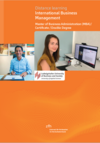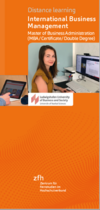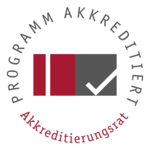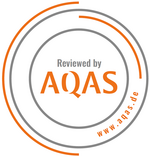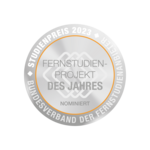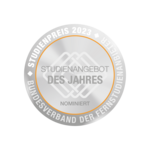2nd semester
Module Management: 1. Controlling, 2. Strategic Management & 3. Business simulation

Prof. Dr. Axel Kihm, CPA, CVA
Ludwigshafen University of Business and Society: Professor of Business Administration, specializing in Financial Accounting
„CONTROLLING is the entire process of goal setting, planning, analysing and monitoring in the financial and performance management of a company. Instruments of operative controlling (e.g. short-term income statement, contribution margin accounting, break-even analysis, financial planning) require a deep understanding of financial and cost accounting. On the other hand, strategic controlling instruments (e.g. Portfolio, SWOT, Scenario, Sensitivity analysis) support the management decision to ensure the long-term success of the company’s business model by providing transparent information at all levels (strategic management analysis). The unifying tool, the Balanced Scorecard, will also be discussed.”

Dr. Malte Busch
Fraunhofer Institute for Systems and Innovation Research (ISI); Researcher at Joint Innovation Hub
„Strategic Management is an activity centered in the formulation and implementation of key objectives and initiatives taken by an organization's leaders on behalf of stakeholders. This is done with regard to resources and an assessment of the internal and external environments in which an organization operates. Therefore, strategic management, as a representation of the overall direction of an organization, is thus not static, but involves feedback loops to monitor strategy implementation to possibly bring about a necessary transformation of the organization. In this module STRATEGIC MANAGEMENT, selected management and innovation concepts will be introduced, scientifically embedded and illustrated by concrete examples from the professional practice as well as from concrete management projects of the lecturer. Against this background, you will have the opportunity to critically reflect on your own practical experiences and observations."

Christian May
Entrepreuneur; Management Consultant with an international focus
„The increasing interdependence of the global economy increases the scope of action of companies in their value chains - from global sourcing to international sales markets. At the same time, competition is intensifying. The competitive business planning game TOPSIM - Going Global shows the participants the entrepreneurial challenges that go hand in hand with the expansion of business activities to international markets. The module BUSINESS SIMULATION depicts six economic areas with different framework conditions. In the role of the management of a washing machine manufacturer, you will initially operate exclusively in your home region. Soon, however, the focus shifts to the internationalization of the company's activities. Within the framework of the simulation process, the opportunities and risks of new markets as well as the strengths and weaknesses of your company must first be identified and evaluated. Following the market entry decision, you are faced with the task of developing appropriate market development strategies and implementing them in your decisions.“
Module International Competency: 1. International market research, 2. International corporate management & 3. Cross-cultural communication

Prof. Dr. Rainer Busch
Ludwigshafen University of Business and Society: Professor of International Marketing Management
„International marketing managers - compared to their nationally operating peers - make decisions in a more complex environment. Therefore, the process of multinational marketing research is more complicated as more countries become involved in management decision-making. The most important factors affecting marketing research in different countries - and thus opportunity recognition - are institutional differences. In simple terms, institutions are management-relevant "rules of the game." These include political, economic, socio-cultural, technological, legal and environmental factors. This module INTERNATIONAL MARKET RESEARCH will address the challenges resulting from the diversity of global markets systematically, systemically, strategically, and by drawing on international management research and case studies and case illustrations. You will be given the opportunity to bring the specifics of your countries of origin into our discussions.“

Ridha Mejri
Assistant Professor at the Worms University of Applied Sciences
"We are living in a VUCA (volatile, uncertain, complex & ambiguous) and glocalized world. Companies´ organizations do not only comprise functional, geographic or product line structures but mainly matrix organizational ones based on project teams. These project teams are international, virtual, multilingual and multicultural. They are expected to be agile, creative, innovative and able to react to changes swiftly. On balance communication, soft, social, digital as well as intercultural skills are indispensable in the business world.
This course will examine the following topics:
1. Analysis of the opportunities & challenges of international business at the macroeconomic & microeconomic levels
2. Market entry strategies (which markets to enter?, when to enter them?, what is the scale of entry? & what is the best mode of entry?)
3. The Internationalization process, e.g. exporting/importing, licensing/franchising, strategic alliance/joint ventures, etc. as well as their advantages & disadvantages
4. Marketing across cultures
5. Managing international teams"
Module Social Competency part Rhetoric

Assoc. Prof. Mika Hietanen
Lund University, Sweden: Senior lecturer of Rhetoric
„Good communication lies at the core of a successful business. During the module RHETORIC, we look at the fundamental mechanisms of efficient communication. Classical rhetorical theory is discussed and applied in practice. We learn about the three modes of rhetorical proofs, the persuasive disposition of a speech (or a text), clear argumentation, and non-verbal aspects of communication. Smaller group-assignments are intertwined with lectures and discussion. The module also includes a debate exercise and ends with an individual speech, devised according to the rules of the art.“


